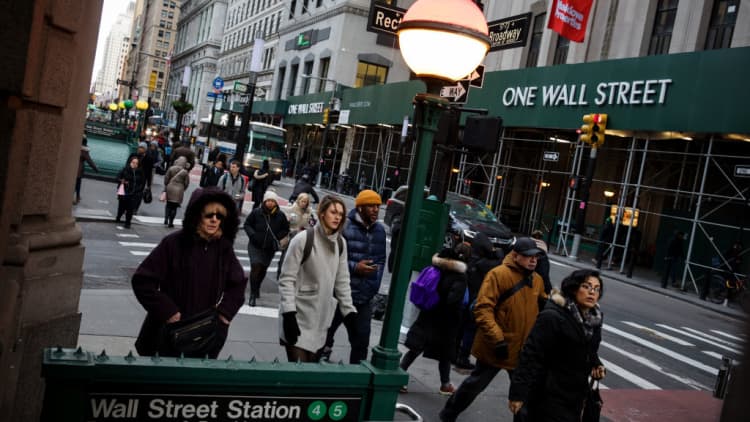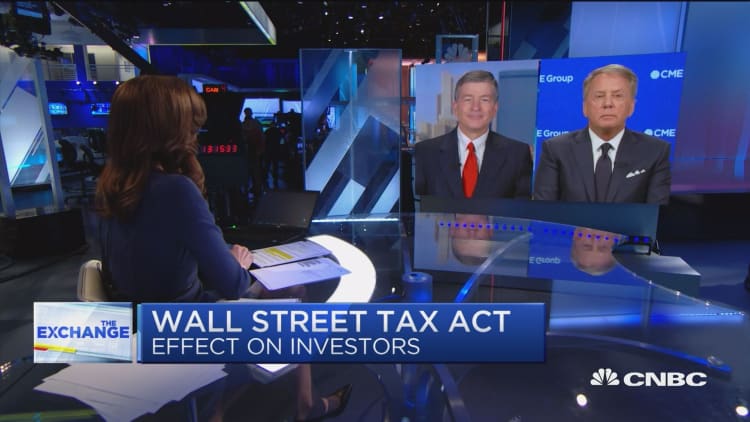Business advocacy groups are going on the offensive against a financial transaction tax that's been proposed by Democrats as a way to curtail high-frequency trading and reduce the budget deficit.
Groups from the political arm of the influential Koch network to the U.S. Chamber of Commerce are already gearing up for a battle with Democrats over their proposals to enact a 0.1 percent tax on securities transactions.
Measures were introduced in both chambers of Congress on Tuesday by Rep. Peter DeFazio, D-Ore., and Sen. Brian Schatz, D-Hawaii. The idea is co-sponsored by more than a dozen lawmakers, including freshman firebrand Rep. Alexandria Ocasio-Cortez, D-N.Y.

The tax proposal is one of several by Democrats that target the wealthy. Ocasio-Cortez has called for a 70 percent marginal tax rate on income over $10 million. Sen. Elizabeth Warren, who is running for president in 2020, backs the idea of a wealth tax of 2 percent on households with more than $50 million in assets and 3 percent on households worth $1 billion or more.
Among groups attacking the financial transactions tax proposal is Modern Markets Initiative, or MMI, which advocates for high-frequency trading.
"The proposed financial transaction tax poses a threat to the very Main Street investors that the sponsors of this bill are aiming to protect," said MMI CEO Kirsten Wegner. "Particularly, pension funds, which millions of Americans rely on as a main source of income after retirement, will suffer as a result of this tax."
A spokeswoman for MMI confirmed the group would be lobbying against the proposal. A person familiar with the upcoming lobbying efforts pointed to a study published in 2017 that shows the negative effects a financial transaction tax can have on pension funds. This person also said the group will be pushing out more data proving how the tax could hurt the average stockholder.
The political network backed by billionaire Charles Koch is also speaking out against the legislation. In a statement first given to CNBC, a spokesman for Americans for Prosperity, or AFP, slammed lawmakers' efforts to create more taxes.
"Real growth and lasting economic security comes when people and businesses are free to invest their earnings into their families, communities, and job creation," said Bill Riggs, a spokesman for AFP. "We cannot tax and spend our way into prosperity. Washington should be looking for ways to rein in reckless spending and eliminate corporate welfare, not reach back into the pockets of hardworking Americans to keep funding it."

The U.S. Chamber of Commerce, the most prominent business group in the country, came out firing — and claimed a tax like the one being introduced in Congress would decrease returns for Americans across the country.
"A financial transaction tax would decrease returns for people saving to buy a house, pay for college, or retire. It would also make it more expensive for businesses to raise the capital they need to start, expand, and create jobs," Tom Quaadman, executive vice president of the U.S. Chamber Center for Capital Markets Competitiveness, said in a statement.
He also invoked the memory of two Democratic presidents to hammer home his point. "Presidents Kennedy and Johnson repealed a similar tax, and we should continue to heed their wisdom," he said.
A person with direct knowledge confirmed the Chamber of Commerce will actively lobby against the bill.
Representatives for DeFazio and Schatz did not return requests for comment.
The nascent lobbying effort is just one of the huge obstacles facing the Democratic proposal.
Some of these organizations successfully championed large aspects of the tax reform bill that was eventually passed by Congress and signed by President Donald Trump at the end of 2017. The law cut the corporate tax rate from 35 percent to 21 percent and made cutbacks to individual rates as well.
In a previous interview with CNBC, DeFazio said he had encountered resistance from outside groups last time he tried to pass a similar piece of legislation two years ago.
"I have experienced this [resistance] in the past, and I imagine there will be some of it this time around," he said Monday. "You would be discouraging high-frequency trading, and they aren't going to be happy with the bill."
WATCH: Hensarling says Wall St. Tax Act will hurt Main Street



